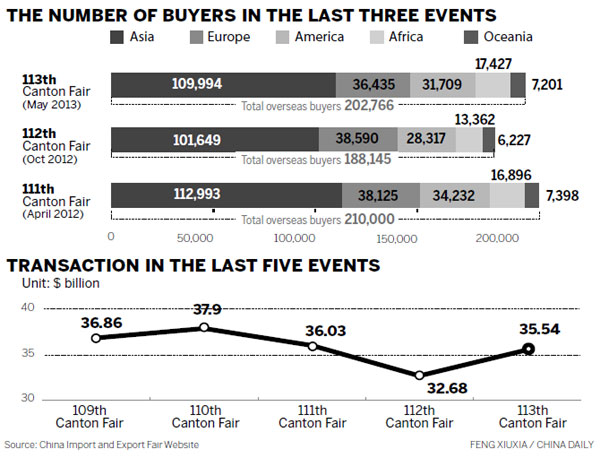Fair exhibitors report successful shift to domestic business
Updated: 2013-05-07 07:11
By Qiu Quanlin in Guangzhou and Li Jiabao in Beijing (China Daily)
|
||||||||
A growing number of Chinese exporters attending the 113th Canton Fair - the annual barometer of China's foreign trade, which finished on Sunday in Guangzhou, the capital of Guangdong province - report they are successfully shifting their traditional export-focused businesses to chasing sales at home.
Chen Zhiyu, vice-general manager of Fujian Meinkind Baby Products Co, for instance, said there is enough demand in China for its child car safety seats.
"More than 80 percent of our products were shipped overseas last year.
"But we are keeping our eyes now firmly on the domestic market, as the overseas market has limited demand for our products," Chen said.
The company, based in Zhangzhou in Fujian province, designs, builds and sells a range of child car safety seats.
"The awareness of Chinese parents to use safety seats in cars is growing, and there will be a increasing demand for our products in domestic market."
Chen said China currently has around 40 manufacturers specializing in making child car safety seats.
"Most of their products are shipped overseas.
"But we plan to shift to the domestic market as early as possible so we can achieve sustainable development in future."
This year's fair organizers reported transactions with traditional buyers from the European Union, the United States and Japan were down 4.9 percent, 0.5 percent and 12.6 percent year-on-year, respectively.
"The number of buyers coming from these areas also decreased, as there is still weak demand in these markets," said Liu Jianjun, a spokesman for the fair and the China Foreign Trade Center, who added that Chinese exporters must diversify their sales to both global and domestic markets.
Liu Juan, the general manager of the export department at Guangdong Winto Ceramics Co Ltd, which was exhibiting at the Fair, said: "Export business is much harder than before the 2008 financial crisis, owing to rising tariffs, and frequent trade investigations, and overseas business is now just a subsidiary part of our business.
"Domestic orders account for 70 percent of our revenue. Demand in the domestic market, with a population of more than 1.3 billion, is huge and stable.
"Domestic consumers emphasize brand value and have stronger purchasing power than those in the European Union.
"We also have the advantage of knowing the esthetic and cultural needs of domestic consumers far better than overseas buyers," she added.
Wang En, the project manager of Hautek Industries Co Ltd, a Zhengjiang-based water purifier manufacturer established in 1985, is also firmly focused on sales at home.
"We used to sell our purifiers to the Middle East, Southeast Asia and Africa.
"But overseas business has not been good in recent years and overseas demand remains weak in the first half of this year and hard to predict for the whole year.
"However, currency fluctuation has become our top challenge and even a currency fluctuation of 2 to 3 percent can significantly erode our profit margin, which is below 10 percent now. Domestic exporters are competing fiercely on price," he said.
"In contrast, sales in the domestic market grow more than 10 percent each year and the profit from sewage treatment is three to four times, owing to our high-end technology."
Wang added that the government also supports the sewage treatment industry and provides 80 or even 100 percent of working capital if needed.
"We are very confident in the prospects of the domestic market."
But the Chinese market also presents challenges, he added.
"It's hard to get professional employees and developing after-sale services is a challenge, as we used to be an exporter.

(China Daily 05/07/2013 page17)

 Michelle lays roses at site along Berlin Wall
Michelle lays roses at site along Berlin Wall
 Historic space lecture in Tiangong-1 commences
Historic space lecture in Tiangong-1 commences
 'Sopranos' Star James Gandolfini dead at 51
'Sopranos' Star James Gandolfini dead at 51
 UN: Number of refugees hits 18-year high
UN: Number of refugees hits 18-year high
 Slide: Jet exercises from aircraft carrier
Slide: Jet exercises from aircraft carrier
 Talks establish fishery hotline
Talks establish fishery hotline
 Foreign buyers eye Chinese drones
Foreign buyers eye Chinese drones
 UN chief hails China's peacekeepers
UN chief hails China's peacekeepers
Most Viewed
Editor's Picks

|

|

|

|

|

|
Today's Top News
Shenzhou X astronaut gives lecture today
US told to reassess duties on Chinese paper
Chinese seek greater share of satellite market
Russia rejects Obama's nuke cut proposal
US immigration bill sees Senate breakthrough
Brazilian cities revoke fare hikes
Moody's warns on China's local govt debt
Air quality in major cities drops in May
US Weekly

|

|







